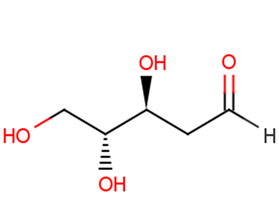
2-Deoxy-D-ribose
CAS No. 533-67-5
2-Deoxy-D-ribose( 2-Deoxy-D-arabinose | 2-Deoxy-D-erythropentose | Thyminose )
Catalog No. M19619 CAS No. 533-67-5
2-Deoxy-D-ribose induces apoptosis by inhibiting the synthesis and increasing the efflux of glutathione.
Purity : >98% (HPLC)
 COA
COA
 Datasheet
Datasheet
 HNMR
HNMR
 HPLC
HPLC
 MSDS
MSDS
 Handing Instructions
Handing Instructions
| Size | Price / USD | Stock | Quantity |
| 100MG | 35 | In Stock |


|
| 500MG | 82 | In Stock |


|
| 1G | Get Quote | In Stock |


|
Biological Information
-
Product Name2-Deoxy-D-ribose
-
NoteResearch use only, not for human use.
-
Brief Description2-Deoxy-D-ribose induces apoptosis by inhibiting the synthesis and increasing the efflux of glutathione.
-
Description2-Deoxy-D-ribose induces apoptosis by inhibiting the synthesis and increasing the efflux of glutathione.
-
In Vitro——
-
In Vivo——
-
Synonyms2-Deoxy-D-arabinose | 2-Deoxy-D-erythropentose | Thyminose
-
PathwayOthers
-
TargetOther Targets
-
RecptorOthers
-
Research Area——
-
Indication——
Chemical Information
-
CAS Number533-67-5
-
Formula Weight134.13
-
Molecular FormulaC5H10O4
-
Purity>98% (HPLC)
-
SolubilityDMSO:10 mM
-
SMILESOC[C@@H](O)[C@@H](O)CC=O
-
Chemical Name——
Shipping & Storage Information
-
Storage(-20℃)
-
ShippingWith Ice Pack
-
Stability≥ 2 years
Reference
1.Fico A et al. 2-deoxy-d-ribose induces apoptosis by inhibiting the synthesis and increasing the efflux of glutathione. Free Radic Biol Med. 2008 Jul 15;45(2):211-7.
molnova catalog



related products
-
ML224
ML224 (NCGC00242364) is a TSHR antagonist for the treatment of Graves' orbital disease and Graves' hyperthyroidism.
-
KRN-633
KRN-633 is an effective VEGFR inhibitor. The IC50s of KRN-633 for VEGFR1, VEGFR2, and VEGFR3 is 170, 160 and 125 nM, respectively.
-
Bathophenanthroline
Bathophenanthroline is a compound used for the measurement of iron concentrations in aqueous, urine, and serum samples by colorimetry.



 Cart
Cart
 sales@molnova.com
sales@molnova.com


